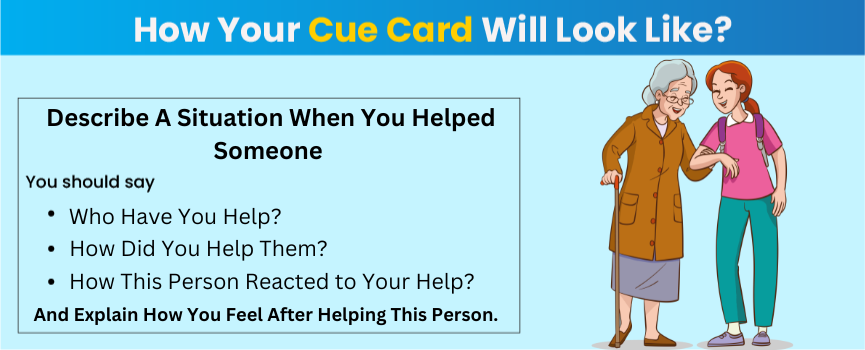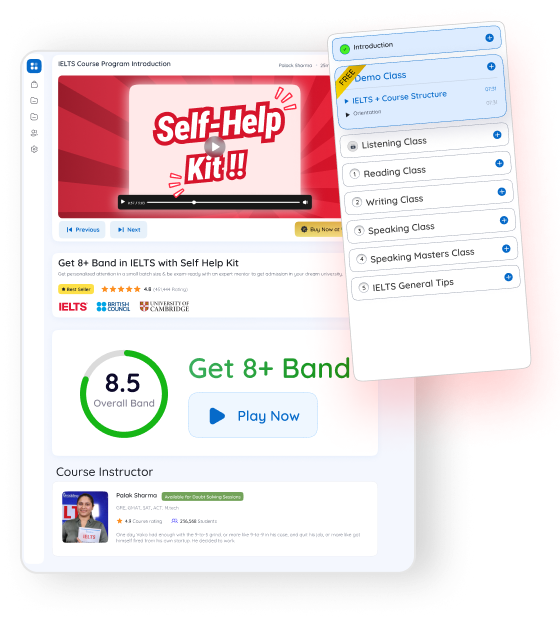Describe A Situation When You Helped Someone - IELTS Cue Card
Last updated: May 7, 2025IELTS is a renowned English language proficiency exam that tests students' English language ability. Moreover, band score helps to get admission to English-speaking countries. Many questions are challenging to solve, such as the cue card in the IELTS speaking section. Moreover, you will find many topics in this cue card, and one of them is Describe a situation when you helped someone. If you are solving this topic and not getting a good score, then worry not, we will help you. Read our blog to explore the three best samples, lexical resources, follow-up questions, and more. So let’s get started.

Table of Contents
Introduction to IELTS Cue Cards
The IELTS cue cards are a part of the speaking section in the IELTS exam. It navigates your speaking skills through four different ways that is fluency, grammar, vocabulary, pronunciation, and coherence. This is the IELTS speaking part 2 question. Moreover, it gauges your skills of how effectively you organize your ideas and expressing your thoughts regarding the topic. Thus, you will find many topics in this, such as the place, person, objects, situation, incidents, or anything. You must be prepared to answer topics like Describe a situation when you helped someone. So, it is important to know how to answer this cue card. For that, you have to read our next section.
How to Answer the Cue Card?
If you want to secure the desired scores in the IELTS cue cards, you have to bend over backwards to ace this exam. However, many students fail to answer this question due to less preparation time and getting anxious. But to answer this IELTS speaking part 2, you must understand the requirements it requires, such as questions, maintaining fluency, accuracy, phrases, and more. Thus, for this cue card, Describe a situation when you helped someone, first, you have to provide an introduction and then answer these questions in brief.
1. Who have you help
2. How did you help them?
3. How this person reacted to your help?
4. Explain how you feel after helping this person?
Here is the image of how your cue card describe a situation when you helped someone will look like when you will receive the IELTS exam.

Describe A Situation When You Helped Someone - Sample 1
This is the first sample of the Describe A Situation When You Helped Someone on helping a foreigner who got lost in a market.
Introduction
I am a very altruistic type of person, compassionate, about helping others. I never miss a boat to help someone, even if it could be a stranger. Here I will describe a time when I helped a foreigner find a way out of a bustling Diwali market.
Who Have You Help?
It’s my family's custom to sit in my father's shop during the Diwali break. Hundreds of people come to the bustling market of Udaipur at the time of Diwali to do shopping. In between the horde of people, a foreigner comes to my father's shop. His name was Oliver, an American traveller, who was juggled up in the market while finding a way to get a trail to a bus station. His face was tensed and unbaled to find a way to step out from the market as he was already late for his bus.
How Did You Help Them?
I directed him to the route to step out from the market, but he asked me to come with him as he portrayed that when he requested help, no one was able to help him because people couldn't understand his language. Thus, he followed me to come out of the market. In the end, I stopped a rickshaw for him so that he could reach the bus station on time.
How This Person Reacted to Your Help?
Oliver was thankful for me to assist him in coming out from the teeming market. He expressed that when he was asking for help, no one was helping him due to the language barrier. Lastly, when he was going asked me for a photo for a reminiscence.
Explain How You Feel After Helping This Person
After helping Oliver, I experienced a different kind of feeling, which is satisfaction and happiness. Dopamine was running into my veins after helping him.
Conclusion
I feel more at ease and hopeful when I carry out a selfless deed. For our mutual prosperity, I hope to help needier persons in forthcoming.

 Access speaking Mock Test
Access speaking Mock Test Describe A Situation When You Helped Someone - Sample 2
This is the second sample of the Describe a Situation When You Helped Someone based on helping elderly people during the time of lockdown.
Introduction
A never-imagined phase arose in our life in 2021 called the COVID pandemic, which led to several months of lockdown for the citizens’ betterment. It was very difficult to shop for groceries during this period, especially for older people. I helped one of the old age couple who used to live near my house.
Who Have You Help?
Uncle Kumar and Aunty Sunita, an elderly couple who were living alone and were at higher risk if they were exposed to the virus, became a biggest problem for them.
How Did You Help Them?
After knowing about this arduous situation, I decided to help them by purchasing their groceries every week. We made a routine, in which they handed me the list of weekly groceries and I would go on their behalf. Also, I safeguarded to abide by all the protocols and put all the things at their doorstep to ensure they don’t come into contact with the disease.
How This Person Reacted to Your Help?
The elderly couple was elated and euphoric by this gesture. Moreover, they were deeply thankful throughout the lockdown period. Whenever they used to call me, we have chattered a lot. Also, they shared some motivational stories from their life, which intensified our bond.
Explain How You Feel After Helping This Person
I was overwhelmed after helping them. The feeling was enormously heart-warming. Also, it gave me an awareness of improving the community and the importance of looking out for each other in a difficult time.
Conclusion
Helping old people in tough times is an act of kindness. It felt very fulfilling and satisfactory after helping them every time. Also, it fortified the faith in the value of interpersonal relationships and the impact that even modest deeds of kindness can have on one another.

Describe A Situation When You Helped Someone - Sample 3
This is the third sample of the Describe a Situation When You Helped Someone based on helping society members in building maintenance.
Introduction
From school time, I had a helping nature that slowly grew up to help people who live in slum areas. I would like to discuss my experience of joining a campaign that helps the slum area people in Mumbai.
Who Have You Help?
I have enrolled in a non-profit organisation campaign named “Jagrukta”. This campaign is famous for helping poor people who live in slum areas in Mumbai. These people don’t have proper houses or roofs to live in during the rainy season. Also, children here starve for food and sleep without consuming a single nibble of nourishment. We went there, met those people, and discussed how they struggled to live here.
How Did You Help Them?
We collected food and clothes a week before coming here. We split everything equally. In this campaign, many people contributed and helped to gather as many items as they could. Moreover, we made a box full of necessary grocery items like rice, flour, pulses, oil, blankets, clothes, toys and more. This is distributed to every house by me and my mates.
How This Person Reacted to Your Help?
People who reside in this place were immensely grateful to us for providing the necessary items. This gesture brings a smile to many people with tears of joy.
Explain How You Feel After Helping This Person
The feeling of happiness was on cloud nine. Helping the needy people and seeing the tears of joy in their eyes gave me a satisfactory feeling. Also, for some time, I felt wicked for those people as they didn’t get enough contribution from the government as they promised to provide all the facilities at the time of the election. I hope I can help them in the time ahead.
Conclusion
I have been inclined to be helpful from my childhood, and the feeling of empathy inside me always pushes me to be kind to others. Helping these people made me realise that humanity still exists if we take out time and help them.
These are the three samples for Describe a Situation When You Helped Someone that you can understand and use in your cue card. However, it is preferable to use a realistic situation rather than any website examples. It sounds canned and may not highlight spontaneity. Thus, for practice, you can use the IELTS speaking mock test. It will help you find the weaknesses and strengths in the exam.

Lexical Resources
After exploring the samples, it’s time to identify vocabulary words used in this. It is essential to use a wide range of vocabulary for IELTS exam in order to showcase language skills and improve your scores. A broad vocabulary impresses the examiner, prevents repetition, and demonstrates a deeper understanding of the topic. Thus, here is the table of the lexical resources.
| Vocabulary words | Meaning |
|---|---|
| Altruistic | Having an unselfish or disinterested concern for the well-being |
| Miss a boat | Miss an opportunity |
| Bustling | Busy or crowded |
| Horde of | A large group |
| Juggled up | Mixed up |
| Trail | A path or way |
| Reminiscence | The act of remembering something/memories |
| Forthcoming | In future |
| Exposed | Not protected from anything |
| Safeguarded | Ensure |
| Arduous | Difficult phase |
| Elated | Very happy |
| Euphoric | Intense happiness |
| Intensified | To make something robust or strong |
| Enormously | Extremely or highly |
| Fortified | To protect something |
| Nibble | To have something by taking small bite |
| Mates | Means friends or teammates |
| Immensely | Synonym of extremely |
| Wicked | Sad |
| Inclined | To behave in a specific way |
Hope these lexical resources will help you make your answer more elaborate and impressive in the IELTS speaking section questions. Now, let's move to the next section to explore the follow-up questions asked in the IELTS cue card. So have a look.
Follow-up Questions
Here are some of the follow-up questions that can be asked you after the IELTS speaking part 2. Have a look at them.
1. How do people usually help each other?
Answer: People help each other by offering different kinds of actions, such as providing practical help, simply being considerate and kind, or providing emotional support. Moreover, assisting in difficult tasks, being a good listener and then providing help or giving advice is also a kind of help. Overall, helping each other to rebuild the communities and enhance overall well-being among the people.
2. Many people only look out for themselves and never think about helping others. What do you think of this attitude?
Answer: According to my vision, I consider this wrong. I know it's common but it is a depressing picture of the world we live in, especially in the big cities. People here are busy in their own world. Also, I am aware that not everyone has become so self-centred to be run off their feet in recent decades. A sizeable portion of the people have completely lost their humanity. No one would be this much of busy who helps a needy one. Perhaps, if any individuals are equipped to understand and respond to the needs of others, they are more preoccupied with their own worlds. It can become a sign that “humanity still exists” when people leave their work for a while to help the needy.
3. What qualities do you think are important when helping others?
Answer: I believe in empathy, generosity, humility, optimism, communication, and most importantly, your patience. It is important to fathom what someone is going through and assist them in providing the right help and support. Moreover, listening to the person patiently helps you to perceive their concern, and communication can help you identify the issue and provide a solution.
4. Have you ever needed help from others? How did that experience shape your perspective?
Answer: Yes, I required help in my job searches and my studies. This helps me to realize the importance of support and community. It inspired me to help others by teaching me that asking for help is not a sign of weakness but rather a means of developing learning from the experiences of others.
5. What kind of people need help in India?
Answer: I consider that the poor, farmers, senior citizens, slum area people, and people with disabilities require more help. It would be preferable if the riches in our nation and economic success could be equally divided, and offer help to them in their difficult times.
These are some of the follow-up questions for Describe a Situation When You Helped Someone that can be asked by the examiner. Besides, they can ask questions associated with your answer. So, be prepared to answer effectively to impress the examiner.
Tips to Excel in IELTS Cue Card
It is said that practice makes the man perfect, but only when you do enough practice with the cue cards in the IELTS speaking section. Thus, here are some of the strategies that you should apply in your preparation.
1. Profoundly read the cue card and understand the prompt or requirement.
2. Brainstorm the ideas to prepare the answer in one minute by using the vocabulary and examples you are going to use in the answer.
3. Structure your speech that address all the questions mentioned in the cue card.
4. Use linking words like also, moreover, perhaps, additionally, etc.
5. Use a timer at the time of practice to determine how much you can cover the topics in two minutes.
6. Focus on vocabulary and grammar to use them correctly in the sentence.
7. Prepare for follow-up questions asked by the examiner, which can be on topic or general.
Conclusion
In summary, the IELTS cue card topic Describe a Situation When You Helped Someone could be hard to answer, but by understanding the samples and follow-up questions, you can ace this. Use the right phrases and vocabulary in your answers to make them more realistic. It will help you to keep engaging the examiner and create a good impression. Thus, if you need more topic-related answers and need guidance to solve these cue cards, you can talk to our expert at Gradding. They provide online IELTS Classes in which they provide the best resources, ielts mock tests, and more to become proficient in solving cue cards.
0 comments

Practice Makes a Man Perfect!Take FREE ielts Mock Tests
Start FREE Mock TestPredict your IELTS Band

98% students got exact IELTS Band
What is your Target IELTS Band?
Get familiar with the Real IELTS Exam for Free!
Start Free Mock TestWe are available in :
BangaloreAhmedabadJaipurHyderabadKeralaPuneChandigarhMumbaiGurgaonChennaiKolkataTrivandrumNoidaKochiCalicutKottayamKollamThrissurIndoreUdaipurdisclaimer:logos and other registered trademarks of universities used on this platform are held by their respective owners. Gradding does not claim ownership or association on them, and their use is purely for informational and illustrative purposes.















